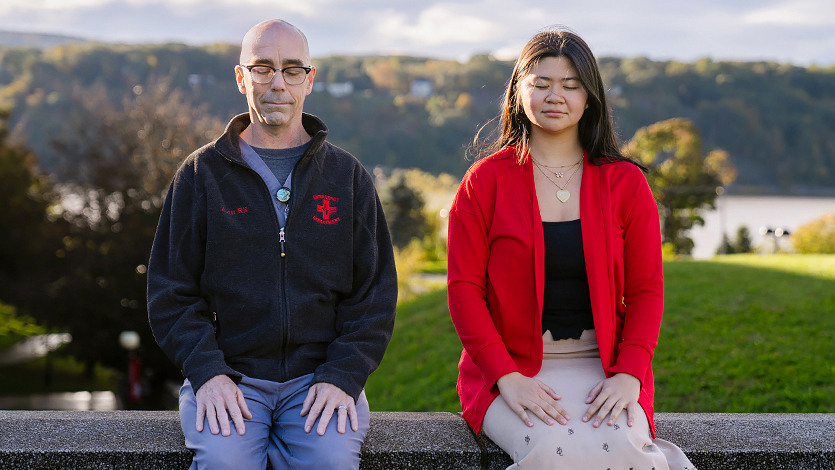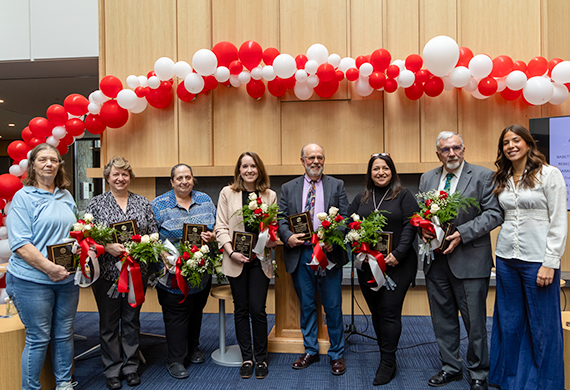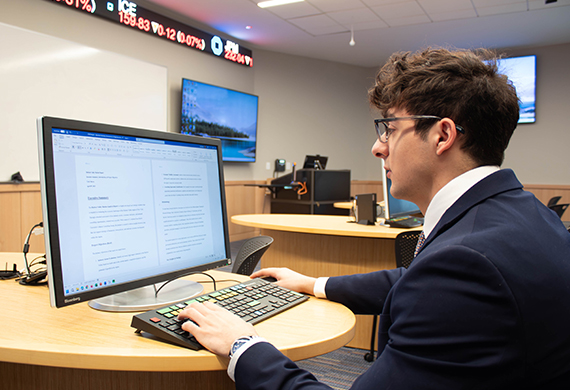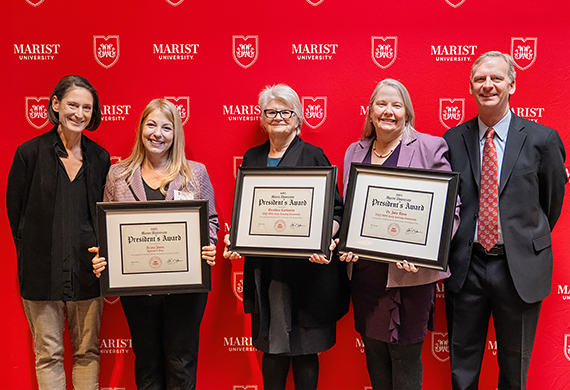Train Your Brain: Mindfulness Resources Uplift Student Mental Health

October 24, 2023 — The pressures of academic performance, social life, transitioning into adulthood, and even world events can weigh heavily on students’ minds. In fact, more than 60% of U.S. college students reported experiencing overwhelming anxiety within the past year, according to the American College Health Association.
In response to that growing need, the practice of mindfulness is sweeping the Marist campus as students, faculty, and staff work to incorporate the powerful practice as a tool for success and stress relief. Mindfulness means living in the present and being more aware and fully engaged in what is happening in one's surroundings – with acceptance and without judgment.
The new "Train your Brain" course, led by Allan Tibbetts, a monk and registered nurse for Health Services, is a four-week workshop dedicated to teaching guided mindfulness meditation and breathing exercises to students. Held at the Counseling Center in Midrise, the experience promotes mindfulness as a versatile tool to help manage stress, boost concentration, reduce anxiety, and enhance self-awareness for a more balanced life.
Train Your Brain student participants with Allan Tibbetts (center). Photo by Michelle Eggink/Marist College.
First-year student Kristin Vinciguerra ’27 said the course translated into tangible results for student participants, including improved sleep quality, heightened focus in class, and increased feelings of calm, self-acceptance, and motivation.
“Learning how to adjust to college life, these practices have been a great way to slow down my busy day and take a breather before going to sleep,” Vinciguerra said. “Mindfulness has helped me de-stress and become more in touch with my emotions.”
Beyond the classroom, students completed supplementary reading and downloaded Koru, a free app for all students who join the course. In the Koru app, students track their progress, experiment with new guided meditations, and participate in group mindfulness activities.
Throughout the course, Tibbetts emphasized that mindfulness is a practice that demands consistent exercise, similar to strengthening a muscle.
“Mindfulness allows us to transition out of our thinking mind into our observing mind, allowing us to be more responsive and less reactive,” Tibbetts said. “Just 10 minutes of mindfulness a day gives students mental clarity, allowing them to prioritize their responsibilities.”
Allan Tibbetts, Train Your Brain facilitator and nurse for Health Services. Photo by Nelson Echeverria/Marist College.
Other departments are also prioritizing student well-being by promoting mindfulness practices in credit-bearing courses and through an on-campus mindfulness collective.
Matteo Undici, a part-time faculty member, instructs an applied mindfulness course that empowers students to cultivate mindfulness practices and share them with the local community. In the course, students get to create their own mindfulness practices through music, visual art, journaling, movement, breathwork, and other experiential learning practices.
“Cutting-edge research proves that mindfulness practices not only help students with increased attention span, self-compassion, and empathy, but also improves performance in business, government, and healthcare professions,” said Undici. “Mindfulness work at Marist has been growing in interest and impact, as students are making big changes in their daily lives and in their community."
Matteo is also a co-creator of the Marist Mindfulness Collective of Interdisciplinary Faculty, who’ve been creating and facilitating specialized mindfulness workshops for First Year Seminar courses since 2021.
Sign up for the next “Train Your Brain” mindfulness workshop here. To learn more about the Mindfulness Collective, contact Matteo Undici.



